Sometimes we see this when the main character of a story is fighting against an enemy of seemingly unsurpassable might; with no other power to turn to, the main character resorts to teaming up with evil in order to defeat evil. And maybe, maybe, he’ll even draw his strength from this person or source of evil.
BACKGROUND OF BLEACH
(If you already know all of this, I would encourage you to skip to the section in bold which reads “The Question”)
Ichigo Kurosaki is such a main character. The manga and anime Bleach is easily one of the most popular Japanese comics and television shows out there, particularly in the shonen (boys) category. The story follows the adventures of fifteen year-old Ichigo Kurosaki, who becomes a Soul Reaper in order to protect his family from the hunger of a Hollow: a fallen soul/spirit of the underworld.
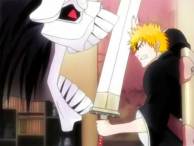
Ichigo is plunged into a life of protecting innocent souls from Hollows, as instructed by Rukia Kuchiki, the Soul Reaper that gave him his powers as a Soul Reaper. Soul Reapers have the duty of saving souls from Hollows, sending those souls to the Soul Society, and purifying the Hollows so that they too may be admitted to the Soul Society.
THE ZANPAKUTO
Every sword that a Soul Reaper has—called a “zanpakuto”—possesses a spirit in itself. This spirit, in both its form and personality/countenance, is a reflection of the Soul Reaper that wields the zanpakuto. There is also an element of mystery encompassing the nature of the spirit which is within every zanpakuto.
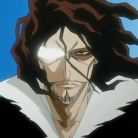
These spirits have minds of their own; and although they cooperate with their Soul Reaper in order to further the advancement of power their Soul Reaper is able to unleash, sometimes the spirits might endeavor to control their Soul Reaper.
Once a person becomes a Soul Reaper and possesses a zanpakuto, his soul becomes intertwined or merged with the spirit that fills his sword. The Soul Reaper draws strength from his zanpakuto, and the spirit of the zanpakuto teaches the Soul Reaper how to wield and unlock the power that the spirit possesses. This bond between Soul Reaper and zanpakuto is intense.
Which is why, if a Soul Reaper isn’t careful, the spirit of his zanpakuto might turn on him.
THE HOLLOW WITHIN
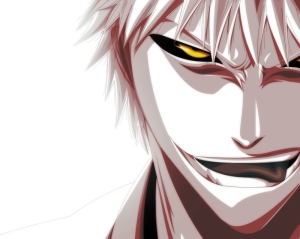
Ichigo’s zanpakuto, and the spirit accompanying it, is named Zangetsu. Originally unknown to Ichigo, there is another side to Zangetsu—a darker side. Zangetsu is one with a Hollow; they are the same person, but one side is good while the other is evil.
The evil side of Zangetsu was said to have been “born” when Kiskue Urahara—Ichigo’s hippy-of-a-mentor—forced Ichigo into regaining his Soul Reaper powers by using a method called “Encroachment”. Encroachment caused Ichigo to run the line between turning into a Hollow himself, or becoming a Soul Reaper (since he had lost his power as a Soul Reaper). The result on the surface appeared to be that he became a Soul Reaper again—clean, plain and simple. However, underlying his transformation was the merging of Zangetsu with Ichigo’s inner Hollow, who was brought about by Encroachment—as a side effect, so to speak.

Yet, it proved to be a much bigger “side effect” than Ichigo expected. When Ichigo battles Byakuya Kuchiki, captain of Squad Six of the Thirteen Court Guard Squads, in order to save Rukia from being executed, Ichigo is suddenly possessed by his inner Hollow. The Hollow saves Ichigo’s life, but states that Ichigo is too weak to be using Zangetsu/himself. At the time, Ichigo is unaware that the Hollow and Zangetsu are the same person.

Ichigo regains control of himself. But ever since his battle with Captain Kuchiki and his possession by his inner Hollow, Ichigo is now always subconsciously aware of the Hollow within himself. And the Hollow wants to come out—to control and possess Ichigo. The struggle to maintain control of his own body and soul steadily grows more intense for Ichigo.
At the same time, Ichigo’s enemies become greater too. After Ichigo saves Rukia from being executed in the Soul Society, Captain Aizen of Squad Five rebels against the Soul Society. Aizen is incredibly powerful, and he plans to completely wipe out Ichigo’s hometown and kill the king of the Soul Society. Aizen is also surrounded by an army of Arrancars—Hollows with the abilities of Soul Reapers—and the Espada, who are high-ranking, super strong Arrancars. These Arrancars, along with Aizen himself, present a huge threat to Ichigo, his friends, and both the members of the Real World and the Soul Society.

Ichigo knows he isn’t powerful enough to defend everyone he cares about. What’s more, whenever he fights and uses more of his own spiritual power, the chances of him being possessed by his inner Hollow skyrocket. His resolve being torn down by the emerging of his inner Hollow, and the threat of exceedingly strong enemies, leaves Ichigo confused and unsure of how he can protect his friends.
THE VISOREDS

Shinji Hirako, along with his team of rogue Soul Reapers, invite Ichigo to become a Visored; a Soul Reaper that learns to subdue, control, and use the power of his inner Hollow. They are called Visoreds for the Hollow masks they wear, which are the center of their power. If Ichigo learns how to control his inner Hollow and use its power, he’ll gain an immense amount of spiritual strength. Without the knowledge of how to maintain his inner Hollow, and facing the danger of Aizen and his Arrancars, Ichigo turns to the Visoreds for assistance.
In the end, Ichigo goes within himself and battles his Hollow, defeating the dark form of Zangetsu and therefore being able to harness his energy. The Visoreds continue with his training, and Ichigo gradually learns to control and use his inner Hollow. The more he battles, the more power he possesses, and the more he relies on using “Hollowfication” as the source of his might.
THE QUESTION
Is it right for Ichigo to resort to using the power of his inner Hollow for the sake of fighting Aizen and saving his friends? Zangetsu, or the dark side of Zangetsu, is clearly something evil by nature. His appearance, his motives, his methods—everything about Ichigo’s inner Hollow possesses some sense of malice and morbidity. Ichigo fights his Hollow and conquers it. Nonetheless, the Hollow doesn’t go away; instead, he allows Ichigo to draw power from him. This power is clearly something dark; Ichigo joins with the evil-side of his soul in order to produce intense spiritual attacks.
So, what’s wrong with this picture?
In order to answer the question of whether it is right to use evil to fight evil, we need to look at the situation from a logical perspective. All of this can be simplified by this basic moral truth:
The end doesn’t justify the means.
This logical statement works could be explained with this example: Say a man wants to become rich. Becoming rich is the “end”. Let’s say further that the man’s “means” of achieving his “end”—becoming rich—is robbing a bank.
The example with the man is similar to Ichigo’s: both ends are good. Ichigo wants to protect his friends and save the world; the man wants to become rich. Nothing is wrong there. But if we say that “the end justifies the means”, then, according to that statement, any means found necessary is “okay”. Why? Because the end, in-and-of-itself, is something good. However, we can see that this is flawed from a moral perspective. Just because the end is good, that doesn’t mean it’s right to reach the end using immoral means. That’s a problem. We could win all wars by torturing the enemy’s citizens until the enemy surrenders—winning a war: good; torturing people to do it: bad. (#lameexample…I know)
So here’s where the truth comes in: The means justifies the end.
This is a logical/moral principle that encourages people to build good upon good. A good means should bring about a good end. Let’s go back to the man that wants to be rich, but make the example different; now his means is getting a job and working hard, and watching his everyday budget: good. The end? He becomes rich: good. That’s the way it’s supposed to work. Not everybody will become rich, of course, if they work hard and watch their budget. But you get the idea.
But then, what’s wrong with Ichigo? What’s wrong with his means?
The main thing wrong with the story, in that Ichigo obtains his source of strength from his inner Hollow, is that the line between what’s good and what’s evil becomes blurred. Ichigo takes on the form of something evil, bringing down his own good character, for the sake of something good. This can lead some people into confusion: is that what heroes do? They join themselves with evil to do good? Do heroes turn into monsters or evil spirits for the sake of what’s right?
The answer is simple.
And ah: monsters and evil spirits don’t do what’s right.
“No, but Ichigo does.”
In a sense, Ichigo does do something good. After all, his end is pure. But his means is not. Evil doesn’t produce good. We can become stronger through dealing with a form of evil that surrounds or threatens us. But evil is never the producer of good.
This might sound like a story from the Bible, to some viewers. Joseph, the son of Jacob, (the one with the swagged-out, colored-cloak) is sold by his brothers into slavery to the Egyptians: bad. However, he rises through the ranks of Egypt to become second-in-command and help his family in a time of famine: good. The “bad” stuff—being sold into slavery—didn’t produce the good—Joseph becoming second-in-command and helping his family. In the story, God gave Joseph a way to react to the evil, so to speak; a loophole. But the evil didn’t create the good.
Nevertheless, Ichigo clearly endeavors to do the opposite. He draws upon the power of evil and assumes an evil form itself. A flaw, or falsity, therefore, corrupts the nature of the story of Bleach. Bleach, whether or not the author Tite Kubo intended this, preaches that we can reach into ourselves and pull out our “inner Hollow” and use it for good.
If we think about it, we can see how this negatively morphs society’s perception of heroism. If Ichigo is equated with being a hero—the one who “defeats the bad guy”—and at the same time is merged with a form of evil, isn’t there a chance those people that look up to Ichigo will think it is right to merge with evil to produce good? To the people of the anime world, Bleach is saying, in however an indirect way, that the face of a hero…well, may indeed look like this:
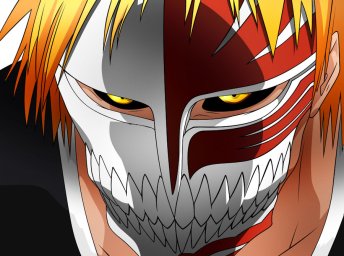
The face of something good is portrayed using the face of evil…doesn’t this seem twisted in any way? Doesn’t that bother you, or seem wrong?
Ichigo’s means? Using evil.
Ichigo’s end? Saving his friends and the world.
Logical? No.
Moral? No.
The means justifies the end, not the other way round.
Tell me what you think and share your thoughts…I’m really looking forward to hearing your take on this!
Dom
https://www.smashwords.com/profile/view/Aul
P.S. Through the end of July only, my eBooks are free at Smashwords.com!
P.P.S. Just a shout-out to my really smart dad who helped me with all of this logic and philosophy 🙂 You know your stuff, Dad!
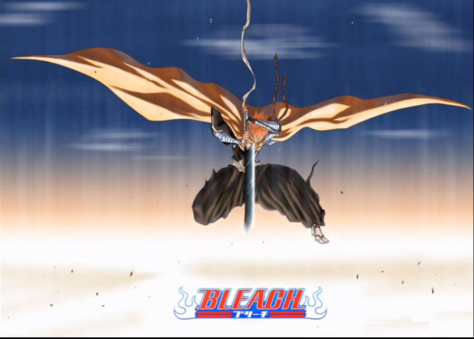
Really interesting! I love how you made clear the distinction between the story of Joseph and what they did in Bleach. …And I have a feeling that I’m gonna use your “end doesn’t justify the means” argument pretty soon. 🙂
LikeLiked by 1 person
Awesome! I’m glad you liked it.
LikeLike
Reblogged this on Montairyus and commented:
Check out this post from The Golden Lands about Bleach (the anime)!
LikeLike
I love the way you put this!
Actually, I’m trying to rehabilitate one of my characters. The world he (and the hero of his story) exist in actually is linked to an alternative world by dreams, and the things people do while dreaming have an effect on that other world–a powerful, even a fundamental effect. Some dreamers become heroes in that alternate world.Others never learn how to connect their dreams and end up living a bunch of fragmented little adventures. Cael, the protagonist, is a classic hero type–with a sword and chain mail (though, as the story progresses, he realizes he prefers the Pilgrim Hero type–with simple clothes and a staff for a weapon, though he still carries his shield, which sort of symbolizes who he is, I think.) Cael’s guide on his journey to link his dreams and save the dream world, which has been damaged both by dreamers and the forces of evil within itself is Arden, who has some serious problems. Arden is, I think, trying to be a good person, but he’s dealing with some really nasty temptations, and he’s not the nicest person–he can be dishonest and untrustworthy, and he’s pretty arrogant–just someone who is generally hard to get along with. Because of the unrealistic things we can do in dreams–flying, breaking the laws of physics, superpowers, etc–I decided to make Arden a bit like a wizard (and a bit like a detective). Arden has specialized in taking unrealistic dream abilities to the next level and can control practically any facet of the environment that he wants to. Arden isn’t trying to further some villain-ish goal, he just wants to rescue his own mentor and save both the inhabitants and all the people who are in danger of dreaming themselves to death. However, his dark side is constantly making it difficult for him. I think he’s got some very serious reasons as to why he’s not exactly a “good person”, but I don’t intend telling the readers why. (He’s not a good person, he’s a person who tries to be good.) And I think that Sciel, Arden’s mentor, the man who has gone missing, was helping him to be a better person (maybe he rescued Arden from the villains in some way? Say, Arden was kidnapped by the villains and/or raised to be evil, and Sciel took him away from that? But the readers will never know, mwahahahaha), so we’re definitely not seeing Arden at his best (such as it is.)
Maybe I’ll redeem him by having him choose to lose his ability to dream ever again in order to save his mentor. Also, that would make a really emotional scene. Sciel is telling him “You don’t have to do this,” and Arden says, “No, I do.”
LikeLike
Wow! Thanks for honoring me with the long comment.
Your book sounds super interesting! Both complex and yet well thought out, with characters that have a lot of depth. That can be hard to find these days.
I’m glad you liked it! It was something about Bleach that really bothered me…it kinda gave it an “anti-Catholic” feel, which of course I disagreed with. I’m just trying to make sure others get the truth too.
LikeLike
I tend to ramble when I’m thinking about something… 😛
Thanks. 🙂 And yeah, I think people like villains way too much these days, or they make their protagonists deliberately “edgy”, even when it doesn’t serve the story. Maybe they’re trying to cash in on the Loki effect? Or it’s a trend or something. Pretty suck-ish one, in my opinion. Sure, everyone’s going to have a dark side, but everyone has a choice to be good or evil, and that’s what separates the heroes from the villains, and I think most people try to be good people in their own way.
I just realized that if this story is ever published, people are going to take it places it wasn’t meant to ever go in their own little minds. Which annoys me when they ship two characters who were never ever EVER meant to be together, but then, that’s their problem, not mine. If they like things that I find disgusting, then they can just go hide in their own dark slimy corners of the Internet. I’m definitely not going anywhere near them!
(No ships with people who could not contract marriage, in the traditional Catholic sense, and I also don’t like ships which pair “mentor” characters with their students/proteges. Just EW. That’s creepy and disgusting.)
LikeLike
Yeah it bothers me too when people have the “heroes” make bad decisions…and then those bad decisions are viewed as “okay” or “understandable”.
And yeah people will always misunderstand your story a little bit but that’s just the way it’s going to be!
LikeLike
I’m definitely not cutting any slack for Arden (and I don’t think he’d want me to.)
Yeah. 😛 I’d rather that they not ship non-shippables, though. X-P
LikeLike
Truuue
LikeLike
He is ironically pretty hard on himself.
LikeLike
Sometimes ppl who try to be good but fail are like that…
LikeLike
Yup. I think he fails sometimes because he is too afraid of failing.
LikeLike
Which is something that a lot of people can relate to…so that’s cool!
LikeLike
Yeah. X-P
Maybe I’ll write a post introducing him to my blog followers…
LikeLike